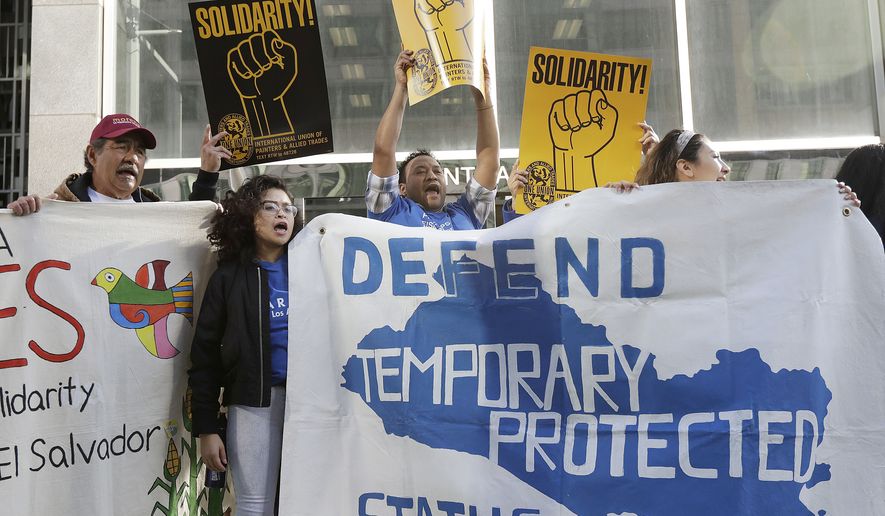A federal judge blocked the administration’s attempt to cancel legal status for migrants from four countries, ruling Wednesday that President Trump poisoned the decision-making by calling them “s—hole” countries.
The ruling means hundreds of thousands of migrants from Haiti, El Salvador, Nicaragua and Sudan, who were going to be forced to return to their home countries, can remain in the U.S. under special humanitarian protections.
Though the decision to rescind Temporary Protected Status was made by Homeland Security, Judge Edward M. Chen, an Obama appointee to the bench, ruled that the White House put pressure on the department.
And he ruled that since Mr. Trump and his aides appear to have shown racial animus toward third world countries, that pressure likely distorted the decision-making process in unfair ways, meaning the entire policy must be put on hold while he sorts it out.
“Because there is evidence that President Trump and/or the White House influenced the DHS on the TPS decisions to at least raise serious question on the merits, the remaining issue is whether there is evidence that President Trump harbors an animus against non-white, non- European aliens which influenced his (and thereby the secretary’s) decision to end the TPS designation,” he ruled. “As plaintiffs have catalogued, there is evidence of such as reflected by statements made by President Trump before, during, and after the TPS decision-making process.”
The Justice Department issued a defiant statement blasting the ruling, saying Judge Chen was trampling on the president’s clear security and immigration powers.
“The Justice Department completely rejects the notion that the White House or the Department of Homeland Security did anything improper. We will continue to fight for the integrity of our immigration laws and our national security,” said spokesman Devin O’Malley.
Immigrant-rights activists, meanwhile, cheered the ruling as a major dent in the kinds of immigration policies they’ve been fighting since the beginning of the new administration.
“The hundreds of thousands of workers with TPS who build our cities and keep them running deserve the security of knowing the lives they’ve built in the US are safe. This shows that Trump’s move to terminate TPS was based in his racial motivations and not in any law or consideration of safety,” said Working Families United, an advocacy group.
More than 262,000 people from El Salvador, 58,000 from Haiti, 5,300 from Nicaragua and 1,000 from Sudan held TPS as of a tally earlier this year.
Nicaraguans have been under the temporary protections since 1998, while the Salvadorans have been protected since 2001. Haiti’s status dates back to the 2011 earthquake, while Sudanese were granted status in 2013.
Under TPS, anyone from those countries who was in the U.S. at the time of designation can remain here, be granted work permits and claim some taxpayer benefits. The status was supposed to be limited to as long as it took their home countries to recover from the disaster or hardship that earned them status in the first place.
Past administrations usually renewed automatically.
But the Trump administration took a different approach, saying previous governments had bent the law and didn’t actually evaluate conditions on the ground.
The judge’s ruling questioned those findings. He suggested Mr. Trump overruled his own department, pointing to internal communications within Homeland Security that showed experts had thought conditions were still bad enough to deserve renewal of TPS.
As evidence of the president’s bias Judge Chen pointed to comments from Mr. Trump during the campaign, including “remarks characterizing Mexican immigrants as drug dealers or users, criminals and rapists” and his call for a ban on Muslims entering the U.S.
He said that bias continued once the president was in the White House, pointing to his speech at the Conservative Political Action Conference this year complaining about MS-13 and calling gang members “animals.”
And the judge pointed to disputed comments from January, when Mr. Trump held a meeting at the White House on immigration and, according to some of those in the room, referred to TPS countries as “s—hole countries.”
Judge Chen said even outside of those comments, the fact that ending TPS would primarily affect “non-white, non-European individuals” makes the decision suspect.
• Stephen Dinan can be reached at sdinan@washingtontimes.com.




Please read our comment policy before commenting.